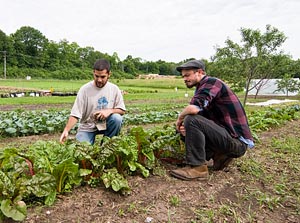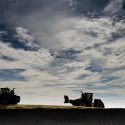Students launch community-supported agriculture farm on campus
From a few feet away, the kale looks perfect, but a closer look reveals a scattering of small holes in the broad, green leaves. A new hatch of flea beetles is beginning to feed.

Vince Smith and Justin Schaude inspect early season produce in the garden operated by F.H. King Students for Sustainable Agriculture near Picnic Point at the University of Wisconsin–Madison. This year, members of the organization are marketing some of the garden’s produce through a 10-member community-shared agriculture (CSA) program. Photo: B Wolfgang Hoffmann
University of Wisconsin–Madison students Vance Smith, Justin Schaude and Alex Weisberg don’t have time to worry about the beetles today. They’re too busy picking kale, lettuce and rhubarb — the season’s first harvest from the 30,000-square-foot plot near Picnic Point in Madison. Every piece of produce they grow has already been sold, and bugs or no bugs, the students need to deliver week after week.
Welcome to UW–Madison’s first community-supported agriculture (CSA) farm, a small-scale experiment created by members of UW–Madison’s F.H. King Students for Sustainable Agriculture. Although the student organization has operated a garden for several years, this year marks its first foray into running a CSA, in which customers make a flat payment at the beginning of the season in exchange for a weekly share of produce. The students sold shares to 10 customers, mostly to friends among the UW–Madison faculty and staff, who received their first shipment June 12.
Another 15 shares go to student volunteers, who devote an average of four hours per week to the program. As an independent student organization, they don’t get any academic credit for their work — but that doesn’t mean they aren’t learning.
"We’re providing a service to students who want to become involved in farm marketing and farm management," says Smith, a graduate student in the Nelson Institute for Environmental Studies who coordinates the effort with Schaude and Weinsberg. "(This is) a case study for students about how to run a CSA."
If the season goes well, the CSA’s customers will savor more than 60 types of fruit and vegetables. Their first shipment included kale, mustard greens, collards, rhubarb and two types of lettuce.
But only about 25 percent of the harvest goes to paying members. As a campus organization funded by student fees, F.H. King has a mandate to provide services to students, and in this case, "service" means distributing vegetables at no cost on Bascom Hill and Library Mall, as well as making donations to food pantries.
In the past, King students have found it’s sometimes easier to grow vegetables than give them away while they’re fresh. The idea to create a CSA came up last winter as a way to deal with that overabundance.
"We were throwing out ideas of how we might get our produce out and how we might get alternative sources of funding to support other projects," recalls Weisberg, a senior majoring in economics and environmental studies. "We all really liked the CSA idea."
A CSA also fits nicely with the objectives of the UW–Madison Center for Integrated Agricultural Systems (CIAS), which coordinates sustainable agriculture research and outreach on campus. CIAS has provided funds to add fruit trees and other perennials to the garden.
"It helps us by creating a bigger pool of students who are interested in these issues," says Michelle Miller, CIAS associate director, who helped found the F.H. King group as an undergraduate 20 years ago. Miller says that CIAS researchers often turn to the F.H. King e-mail list to find students to assist with projects.
Miller says the small campus CSA isn’t likely to provide serious competition to local market gardeners, but it will provide some benefits.
"They too are looking for skilled and experience field hands and farm managers and neighbors doing similar work," Miller says. "You can talk all you want in the classroom. But you can’t understand what it means to deal with unpredictable weather and other challenges until you’ve really had to do it."


